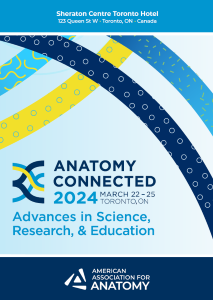Anatomy Education Posters
Poster: Anatomy Education Posters
100 - Incorporating Structured Metacognitive Training into an Undergraduate Anatomy Classroom
Sunday, March 24, 2024
5:00pm - 7:00pm US EDT
Location: Sheraton Hall
Poster Board Number: 100
There are separate poster presentation times for odd and even posters.
Odd poster #s – first hour
Even poster #s – second hour
Co-authors:
There are separate poster presentation times for odd and even posters.
Odd poster #s – first hour
Even poster #s – second hour
Co-authors:
Kristina Dzara, PhD, M.M.S.c. - Assistant Dean, Center for Educator Development, Advancement, and Research, Saint Louis University School of Medicine

Aidan Ruth, PhD
Assistant Proessor
Saint Louis University School of Medicine
Saint Louis, Missouri, United States
Presenting Author(s)
Abstract Body : Metacognition includes the processes that learners use to plan, monitor, and assess their own learning, and is tied to academic performance, ownership of one’s learning, and with growth-oriented attitudes toward learning. These skills are crucial for developing lifelong, self-directed learners. Learning anatomy presents challenges to learners at all levels, and for many necessitates a change in learning strategies and metacognitive awareness. In this study, we sought to examine whether specific metacognitive training during an undergraduate anatomy course could improve metacognitive skills and awareness.
All students enrolled in an undergraduate baccalaureate anatomy course were invited to participate in this study (Saint Louis University IRB #33160). At the beginning and end of the course, students completed the Metacognitive Awareness inventory (MAI) and several short free response questions for a small amount of course credit. Individually matched pre-and post-course MAI scores were compared using paired sample t-tests. The authors conducted a directed content analysis for the free response questions using the “knowledge of cognition” and “regulation of cognition” domains and their associated subcategories as assessed in the MAI. Qualitative and quantitative data were analyzed independently prior to merging through a convergent mixed-methods design.
All three subcategories associated with Knowledge of Cognition showed an increase from pre- to post-course questionnaires. Declarative knowledge improved from 6.54 to 7.04 (p < 0.001); Procedural from 3.39 to 3.60 (p < 0.001) and Conditional improved from 4.28 to 4.45 (p = 0.003). Effect sizes as measured by Cohen’s d were small to moderate (-0.32, -0.28, and -0.19, respectively). Only two of five subcategories associated with Regulation of Cognition showed significant differences between pre- and post-course questionnaires: Information Management strategies increased from 7.73 to 8.54 (p < 0.001; d = -0.43) and Evaluation increased from 4.00 to 4.54 (p < 0.001; d = -0.29). Directed content analysis revealed that students displayed an increase in metacognitive knowledge, particularly in the “Knowledge of Cognition” domain. While “Regulation of Cognition” did develop for some learners, others also had insightful comments about their challenges in this area – particularly planning, motivation, and focus while learning independently.
These results demonstrate that metacognitive training situated in the context of an undergraduate anatomy course does help to improve students’ metacognitive knowledge, and particularly their “Knowledge of Cognition.” However, more targeted, specific strategies may be useful to help develop students’ “Regulation of Cognition."
All students enrolled in an undergraduate baccalaureate anatomy course were invited to participate in this study (Saint Louis University IRB #33160). At the beginning and end of the course, students completed the Metacognitive Awareness inventory (MAI) and several short free response questions for a small amount of course credit. Individually matched pre-and post-course MAI scores were compared using paired sample t-tests. The authors conducted a directed content analysis for the free response questions using the “knowledge of cognition” and “regulation of cognition” domains and their associated subcategories as assessed in the MAI. Qualitative and quantitative data were analyzed independently prior to merging through a convergent mixed-methods design.
All three subcategories associated with Knowledge of Cognition showed an increase from pre- to post-course questionnaires. Declarative knowledge improved from 6.54 to 7.04 (p < 0.001); Procedural from 3.39 to 3.60 (p < 0.001) and Conditional improved from 4.28 to 4.45 (p = 0.003). Effect sizes as measured by Cohen’s d were small to moderate (-0.32, -0.28, and -0.19, respectively). Only two of five subcategories associated with Regulation of Cognition showed significant differences between pre- and post-course questionnaires: Information Management strategies increased from 7.73 to 8.54 (p < 0.001; d = -0.43) and Evaluation increased from 4.00 to 4.54 (p < 0.001; d = -0.29). Directed content analysis revealed that students displayed an increase in metacognitive knowledge, particularly in the “Knowledge of Cognition” domain. While “Regulation of Cognition” did develop for some learners, others also had insightful comments about their challenges in this area – particularly planning, motivation, and focus while learning independently.
These results demonstrate that metacognitive training situated in the context of an undergraduate anatomy course does help to improve students’ metacognitive knowledge, and particularly their “Knowledge of Cognition.” However, more targeted, specific strategies may be useful to help develop students’ “Regulation of Cognition."

